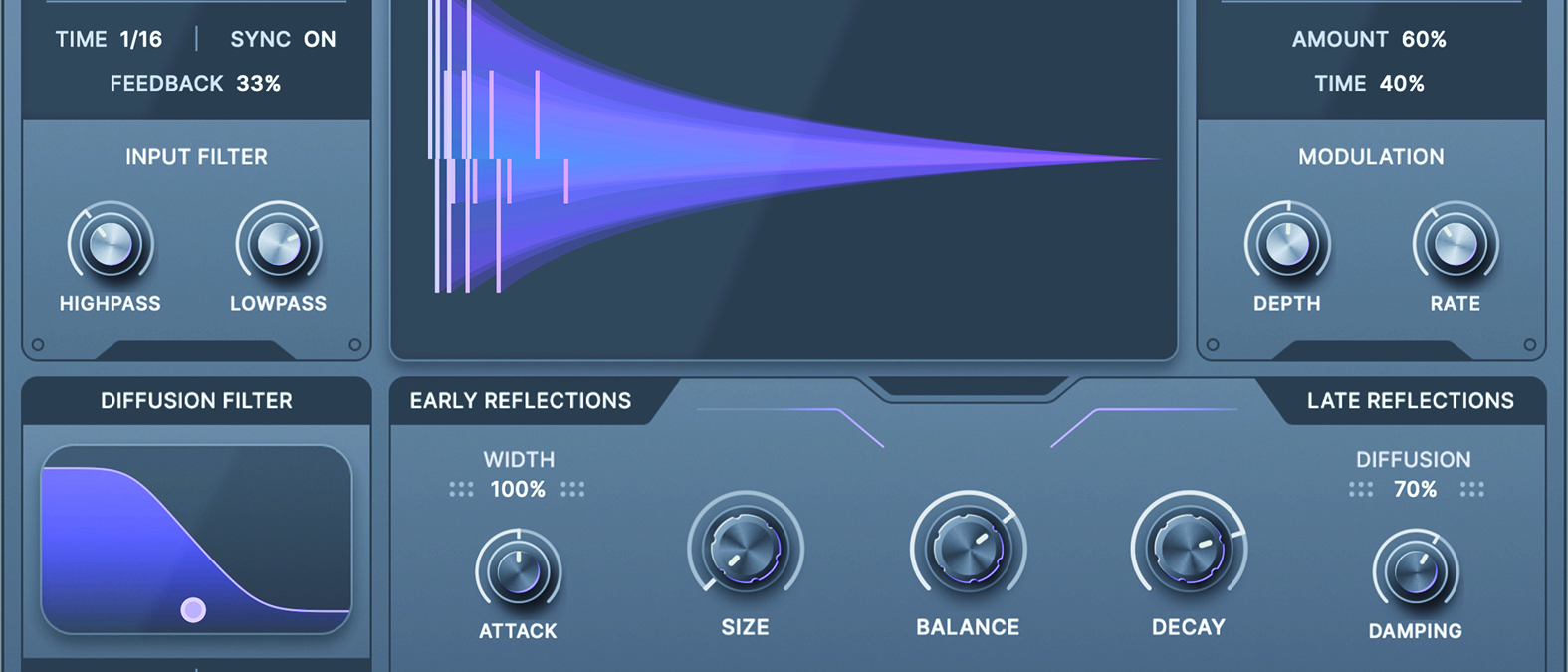MusicRadar Verdict
There are more capable all-round reverbs out there, but Swarm is nicely immediate and fun when pushed to its extremes.
Pros
- +
Easy-to-use and stylish UI.
- +
Various timing elements are great for creative, rhythmic effects.
- +
Sounds great on drums.
Cons
- -
Lacks some of the depth of more advanced reverbs.
- -
No output EQ or filter.
MusicRadar's got your back
Minimal Audio Swarm Reverb: What is it?
macOS: 10.9 or higher
Windows: 10 or higher
Format: 64-bit AU, VST, VST3, and AAX
Buy at Plugin Boutique
Minimal Audio has developed quite a nice niche with its effect plugins, aiming for a space where creative applications meet with ease-of-use and accessibility. The likes of the company’s flagship Rift distortion, Fuse multiband compressor and Cluster Delay all specialise in modern, powerful effect processes, but delivered in ways that make them usable even if you don’t want to interrogate the intricacies of what’s actually going on.
Minimal’s latest, Swarm Reverb, also fits into this category. Described as a ‘creative dual-stage reverborator’, this is an algorithmic reverb plugin that’s particularly good at pumping, rhythmic ambiences and tempo-synced spatial effects, created by pushing its various features into unnatural territory.
Minimal Audio Swarm Reverb: Performance and verdict
The plugin UI features four main sections. The most important of these is the main reverb control, which has five dials for tailoring the early and late reflections (ie the dual stages of the reverb). The first control here is an Attack dial, which alters the impact of the early reflections, and can sound delay-like or reversed at extreme settings. This is joined by a Size control, altering the early reflections, and Decay, controlling the length of the late reflections. A Balance control is used to blend these elements, while the final dial applies damping to the high frequencies of the late reflections.
This section also has numerical controls to set the width of the overall reverb, as well as a diffusion amount that alters the spaciousness of the overall effect. This latter element can be tailored further in the Diffusion Filter module, which can apply a variable low-pass filter to the feedback loop used for diffusion.
Above this sits an input module containing high- and low-pass filters along with controls for the pre-delay. Pre-delay can be set up to 500ms in length, can be synced to project tempo, and includes a feedback control, all of which can be combined to create some interesting over-the-top rhythmic effects.
The final element is a modulation section with two elements. The first of these is a simple unsynced LFO used to modulate the reverb, which is capable of some nice chorus and detune effects, depending on the depth. The second modulation element is a ducking tool, used to duck the wet effect out of the way of the dry signal, accompanied by a timing control that adjusts the speed of the effect.
There are certainly deeper reverb plugins out there when it comes to all-round versatility, but Swarm Reverb sounds great, is well-priced and is thoroughly approachable. Pushed to its extremes, it can do some nicely weird things, too – which is well-demonstrated by the stock of varied presets.
MusicRadar verdict: There are more capable all-round reverbs out there, but Swarm is nicely immediate and fun when pushed to its extremes.
Minimal Audio Swarm Reverb: The web says
"Minimal Audio’s Swarm Reverb is an intuitive, great-sounding and ultimately fun-to-use reverberation plugin."
MusicTech
Minimal Audio Swarm Reverb: Hands-on demos
Minimal Audio
JA MUSIC TV
saucy moon
Minimal Audio Swarm Reverb: Specifications
- KEY FEATURES: Dual-stage reverb plugin.
- Formats: Mac/PC, AU, VST, VST3, and AAX. Included in MA’s Current All Access subscription.
- CONTACT: Minimal Audio
I'm the Managing Editor of Music Technology at MusicRadar and former Editor-in-Chief of Future Music, Computer Music and Electronic Musician. I've been messing around with music tech in various forms for over two decades. I've also spent the last 10 years forgetting how to play guitar. Find me in the chillout room at raves complaining that it's past my bedtime.
“Built from the same sacred stash of NOS silicon transistors and germanium diodes, giving it the soul – and snarl – of the original”: An octave-fuzz cult classic returns as Jam Pedals resurrects the Octaurus
What’s the buzz? Meet Yellowjacket, Cherry Audio's recreation of EDP’s trend-setting Wasp from 1978
“A fabulous trip through all eight songs by 24 wonderful artists and remixers... way beyond anything I could have hoped for”: Robert Smith announces new Cure remix album











